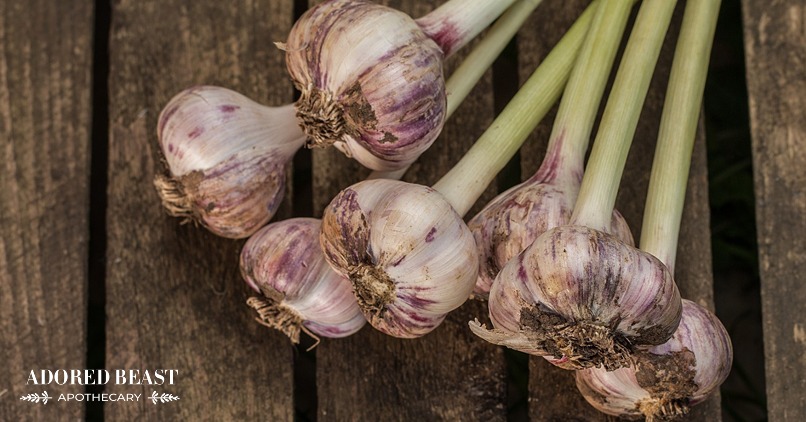Doing an internet search you’ll notice numerous web pages claiming the toxicity of garlic for dogs. Anemia, collapse, diarrhea, drooling, vomiting and even death are attributed to dogs consuming garlic. Yes, these warnings are scary. However, they’re misleading.
Garlic misinformation is real. Yes, too much garlic can harm your dog. “Too much” applies to all herbs. The only difference between help and harm is dosage. If used properly, garlic offers a myriad of health and disease preventing benefits.
Research based evidence of garlic’s toxicity is based on excessive and lethal doses of garlic as well as variant extracts and methodology. In one study, researchers used an equivalent of four full heads of garlic, or 60 cloves, and administered them to a 75 pound dog. This was definitely an overdose! I think if I ate 60 cloves of garlic I would need a new stomach lining or my stomach pumped.
Garlic’s Need To Know
Does garlic have its risks? Yes. Here’s what you need to know. Certain dog breeds have genetically predisposed garlic sensitivities. They include: Akitas and Shiba Inus. These two breeds are sensitive to “hemolysis,” also referred to as Heinz Body hemoytic anemia. It’s a serious condition and reason for concern. Thiosulfates and N-propyl disulphide found in garlic break down red blood cells causing oxidation and early cell death. Thiosulfates are also found in chives, onions, and shallots.
If you suspect a breed issue or your dog might be garlic sensitive you can do genetic testing or talk to your holistic vet. If you’re feeding garlic and your dog has any of the symptoms below, see your vet immediately.
Signs of Heinz Body Anemia
- diarrhea
- dark urine
- decreased appetite
- jaundice
- lethargy
- pale gums
- rapid heart beat
- labored breathing
Puppies (6 months and under) don’t produce enough red blood cells for garlic processing. This is especially true of puppies two months and under. Pregnant or lactating dogs should also avoid garlic.
Garlic can cause digestive upset as it’s warming, contains sulphur and fructans. Fructans irritate dogs with gut inflammation, irritable bowel disease, and leaky gut. This usually happens when fructans ferment in the small intestine resulting in gas and constipation.
Garlic can interact with pharmaceuticals like antacids, blood thinners, chemotherapy, heart medications, immune suppressants, and insulin. If you have any questions or concerns about using garlic alongside pharmaceuticals or specific conditions, speak with your holistic vet.
Lastly, garlic thins the blood so avoid using it before surgery. Consult your holistic veterinarian if you have any concerns.
Garlic for Dogs: The Benefits
Here’s the good news, garlic is a wonderful supplement in small dosages.
In fact, it can be highly nutritious.
Garlic’s nutritional components:
- Inulin
- Amino Acids
- Sulphur
- Zinc
- Potassium
- Phosphorous
- Vitamin A
- Vitamin C
- Calcium
- Magnesium
- Manganese
- Selenium
- Germanium
- B-Complex Vitamins
And here are a few of its benefits:
- anticancer
- antifungal
- antiparasitic
- antioxidant
- antibiotic
Hundreds of chemical constituents make garlic a nutritional powerhouse. Constituents like ajoene which gives garlic its antifungal, antiparasitic, and antitumor effects. Alliin is a major amino acid in garlic. When you chop fresh garlic, it turns into the enzyme alliinase. Alliin and alliinase combine forming allicin, responsible for garlic’s cardio-protective properties.
Garlic can help balance fungal overgrowth like candida. It’s cardio-protective, so it helps dilate blood vessels, bring down unhealthy cholesterol levels, and regulate blood pressure. It increases immunity and enhances natural killer cell production, helping prevent chronic diseases like cancer.
Living in our increasingly toxic environment, we’re needing consistent dietary supplementation for disease prevention. According to researcher Rajdeep Chowdhury, antioxidant-rich garlic chelates (reduces) heavy metals like lead, cadmium, methlymercury, and phenylmercury. He notes fresh garlic is “ full of organo-sulfur groups, volatile oils, enzymes, carbohydrates and amino acids.”
S-allylmercaptocysteine, garlic’s organic sulphur component helps reduce cancer cell proliferation by causing cancer cell death (apoptosis). Diallyl Disulfide (DADS), another beneficial constituent, helps prevent gastrointestinal cancer by suppressing inflammation.
Your dog’s lymphatic system helps remove wastes. Garlic helps remove lymph stagnancy and increase elimination. Good assimilation (cellular nutrition) and elimination are a key component of any preventive health regimen.
Garlic for Pests?
Fleas and ticks don’t like smelling garlic. I’ve used garlic for years and have found that it really helps keep down the critter load on all of my dogs. It works by building up in your dog’s coat oils. This process takes at least two weeks of consistent feeding.
You can use organic granulated garlic but you’ll be missing out on many of garlic’s benefits. Garlic oil and capsules aren’t recommended for dogs due to dosage sensitivity.
For Granulated Organic Garlic: Feed daily for three weeks dropping down to three times per week for maintenance. Start regimen over after bathing.
Given once daily:
- Extra-small dogs 1/16 tsp
- Small dogs 1/8 tsp
- Medium dogs 1/4 tsp
- Large dogs 1/2 tsp
- Extra-large dogs 3/4 tsp
[NEXT UP] For more natural flea and tick remedies, check out this post from Dr. Katie Kangas.
Garlic Energetics
Limit garlic usage if your dog is too dry or warm. Garlic’s energy is warming and drying meaning it warms your dog’s body and with long term use it drys out their internal tissues. I only feed garlic during flea season to my dog who’s slightly dry and a bit warm.
Garlic’s pungency moves energy upward and outwards improving circulation and balancing too much moisture. It also helps remove stagnate conditions by breaking down wastes before they enter the bloodstream, helping your dog assimilate nutrients and eliminate wastes in the gastrointestinal tract.
Using Fresh Organic Garlic for Dogs
Allinase comes from freshly chopped and fed garlic. If you want garlic’s medicinal benefits, you’ll want to get chopping! Allicin needs development time but depletes quickly. Sit garlic out for 10 to 15 minutes and then feed.
Source fresh, unpeeled, organic garlic bulbs when using it for medicinal applications. Try sourcing garlic as close to your home as possible and make sure it’s grown organically. This means in good soil without nasty pesticides and herbicides, especially glyphosate.
Fresh Organic Garlic Suggested Amounts: This is based on 1 tsp per every 30 pounds. For example, a hundred pound dog would receive 3 teaspoons. Always round down. Feed daily for three weeks for fleas and ticks then drop down to three times per week. Feed daily or every other day for other benefits.
Amount Guide:
- 5 lbs – 1/6 tsp
- 10 lbs – 1/3 tsp
- 15 lbs – 1/2 tsp
- 20 lbs – 2/3 tsp
- 30 lbs – 1 tsp
When used properly, garlic offers numerous benefits. If your dog is a good candidate for garlic it can enhance your dog’s health and longevity. If you’re worried about safely using garlic, don’t. There are many other herbs that offer a whole host of wondrous benefits!












